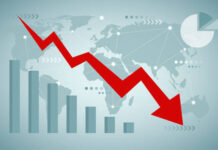BB revises down economic growth outlook to 5.7-6pc, sees risks of rising inflation
Bangladesh Bank has revised down the country’s GDP growth outlook for the current fiscal year due to severe political unrest, following similar projections by development partners.
The central bank also sees risks of a rise in inflation amid the ongoing blockades and shutdowns that have almost broken the supply chain.
Bangladesh’s GDP growth is likely to range between 5.7 percent and 6 percent against the government’s budgetary growth target at 7.2 percent for the current fiscal year, the BB said in new forecasts.
Bangladesh saw an economic growth rate of 6.3 percent last fiscal year, while the rate has been 6.2 percent on average for the last four years.
“The recent escalation of nationwide shutdowns has led to the downward revision of our growth forecast, which was previously around 6.2 percent,” the central bank said in a quarterly report for the July-September period.
Earlier the International Monetary Fund had forecast Bangladesh’s GDP (gross domestic product) growth would be 5.5 percent, while the World Bank’s projection was at 5.7 percent.
Zahid Hussain, lead economist at the WB’s Dhaka office, said the BB projection is much more realistic than the budgetary projection. “The lower range is closer to reality.”
The BB said the services sector will be hit hard in the current fiscal year due to political unrest.
It said though the services sector data is available only on an annual basis, a number of proxy indicators such as trade financing and bank advance to transport and communication sector reflect slower services sector growth during the first quarter.
Data on bank advance shows that the growth of credit to the trade sector declined to 12.93 percent in the first quarter of the current fiscal year, from 24.68 percent in the same period last year.
The BB report said bank credit to the transport and communication sector registered a negative growth of -43.54 percent as against a positive growth of 85.68 percent in the same period of the previous fiscal year.
Retail and wholesale trade, hotel and restaurant business and tourism are facing a sluggish demand due to frequent shutdowns during the quarter under review.
The report also said low growth in cement production (3.61 percent) and negative growth in iron and steel production (-8.72 percent) indicate slowing growth in the construction sub-sector.
It said one positive indicator is the growth in the number of mobile phone subscribers, which rose by 18 percent to 110.68 million at the end of September 2013 from 93.78 million at the end of September 2012.
The telecom services sector is likely to remain buoyant particularly following the introduction of 3G services in September, the report said.
The sluggish services and construction sector data and negative growth in remittances (-8 percent) suggest that the aggregate demand will be lower than in fiscal 2013.
Hussain of the WB also agreed that the services sector was being affected severely by the political turmoil. He said the losses in the sector are not recoverable.
Some of the losses in the industrial sector may be recovered later but the loss in the garment factories could not be recovered, Hussain said. In the agriculture sector, both production and income are being affected by the unrest.
Though the government plans to contain inflation within 7 percent in the current fiscal year, the central bank sees a number of risks.
Wage increases in both the private and public sectors and the decision to set up a public sector wage board will create aggregate demand pressures, the BB report said.
Another risk to food inflation in particular stems from possible supply-side disruptions due to prolonged nationwide strikes.
Finally, the recent rise in inflation could also transmit to Bangladesh as shown by historical long-term trends, the BB said.
Source: The Daily Star










